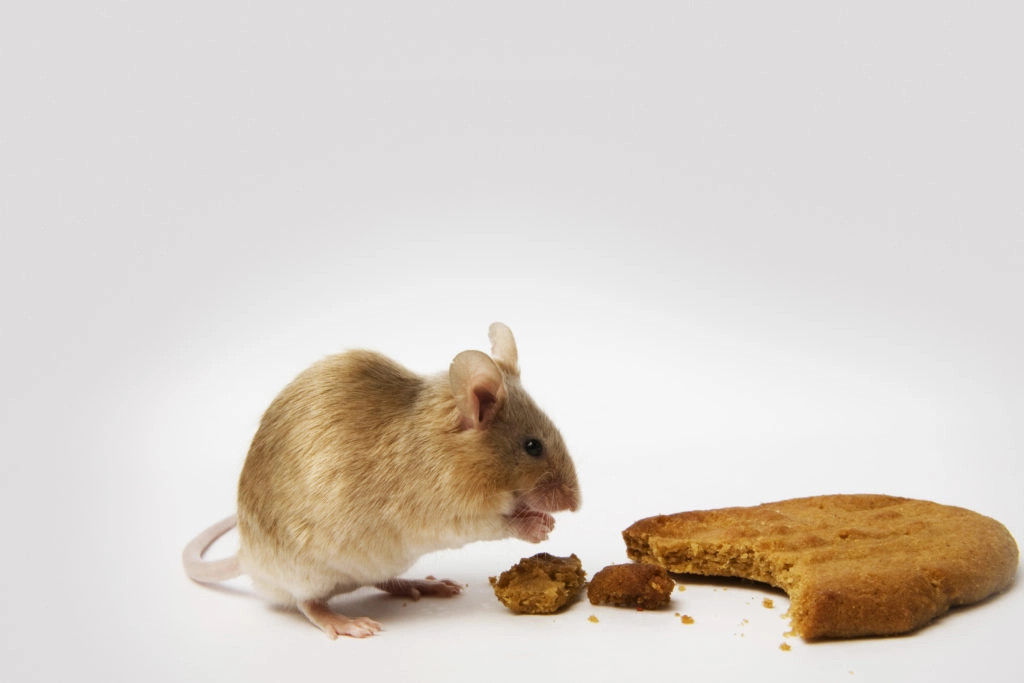When a mouse scurries across your floor, your first reaction might be surprise or even alarm. Once the initial shock subsides, a thought often turns to what attracts these creatures into our spaces: food.
 A house mouse delicately nibbles on a cookie, highlighting their constant need for food sources in residential environments.
A house mouse delicately nibbles on a cookie, highlighting their constant need for food sources in residential environments.
Mice are highly adaptable rodents, but like all living creatures, they have basic needs for survival. While they are known for their ability to find sustenance in seemingly barren environments, a crucial question for homeowners and pest control alike is: how long can mice realistically survive without food? Understanding the answer is key to effective rodent management strategies.
The Critical Need for Food
Mice have a very high metabolism due to their small size and warm-blooded nature. This rapid metabolism means they require frequent meals to maintain their energy levels and body temperature. Unlike some larger animals that can store significant fat reserves to endure periods without food, mice have very limited fat storage capacity. This biological constraint makes them far more dependent on a consistent supply of food.
Survival Timeframe Without Food
Generally, mice can only survive for 2 to 4 days without food. This is a relatively short period compared to many other animals, and it underscores their constant need to forage and consume food. However, this timeframe is not absolute and can be influenced by several factors.
Factors Influencing Food Deprivation Survival
Several factors can affect how long a mouse can survive without eating:
- Water Availability: Access to water significantly impacts a mouse’s ability to withstand food deprivation. If mice have water, they might survive slightly longer than if they are deprived of both food and water. Water helps maintain bodily functions and can marginally extend survival time, but it cannot compensate for the lack of caloric intake from food.
- Environmental Conditions: The surrounding environment plays a crucial role. In cold temperatures, mice expend more energy to stay warm, thus requiring more food and shortening their survival time without it. Conversely, in warmer environments, their metabolic rate might slightly decrease, potentially extending survival by a few hours, but not significantly.
- Activity Level: A mouse’s activity level directly correlates with its energy expenditure. A highly active mouse, constantly searching for food or evading predators, will burn through its energy reserves much faster than a sedentary mouse in a safe, warm location. Wild mice generally have higher activity levels than those living in human dwellings with readily available shelter and less predation risk.
- Age and Health: Younger mice and those in poor health are less resilient to food deprivation. Their bodies are not as robust, and they lack the reserves of healthier adult mice. Older or sick mice will succumb to starvation faster than healthy adult mice.
- Stress Levels: Stress can increase metabolic rate. A stressed mouse, perhaps due to new traps or changes in its environment, might require more energy and thus deplete its reserves quicker than a mouse in a stable, stress-free environment.
Wild vs. Domestic Mice
The environment drastically changes the survival odds for mice.
- Wild Mice: Wild mice face harsh conditions – fluctuating temperatures, predator threats, and the need to actively search for food and shelter. These factors increase their energy expenditure, making them less likely to survive for the upper end of the 2-4 day range without food.
- House Mice: Mice that have infested homes often have a much easier time. They are sheltered from the elements, face fewer predators, and often have access to readily available food sources, even if we try to eliminate them. However, even in a home, removing all food sources will eventually impact them.
What Happens When Mice Lack Food?
When mice are deprived of food, their bodies quickly begin to break down fat and muscle tissue for energy. Initially, they will become increasingly weak and lethargic. They will reduce their activity to conserve energy, becoming less explorative and less efficient at foraging for any remaining food scraps.
Prolonged food deprivation leads to severe weakness, organ damage, and eventually death. Their immune system weakens, making them more susceptible to diseases. Starvation is a slow and debilitating process for mice, highlighting why they are constantly driven to seek out food.
Implications for Pest Control
Understanding how long mice can go without food is essential for effective pest control. While eliminating food sources is a crucial step in rodent management, it is rarely a standalone solution.
- Food Source Removal: Cleaning up crumbs, storing food in sealed containers, and reducing accessible garbage is vital to discourage mice. This makes your home less attractive and reduces their readily available food supply.
- Limitations of Starvation: Simply waiting for mice to starve is not a practical or humane pest control method. Mice are adept at finding hidden food sources, and even if you remove obvious food, they may find enough to survive longer than you expect. Moreover, relying solely on starvation can take days, during which time the mice may continue to cause damage and breed.
- Integrated Pest Management: Effective mice control requires an integrated approach. Combining food source removal with trapping and baiting strategies is far more effective. Traps can quickly reduce the population, and baits can be used strategically when food sources are limited. Sealing entry points is also crucial to prevent new mice from entering.
Conclusion
While mice can only survive a few days without food, relying on starvation alone for pest control is ineffective and impractical. Their high metabolism and constant need for sustenance mean they are always seeking food, making food source management a critical component of any rodent control strategy. For lasting and efficient mice control, combine food management with other methods like trapping, baiting, and exclusion techniques, and consider consulting a pest control professional for persistent infestations.


